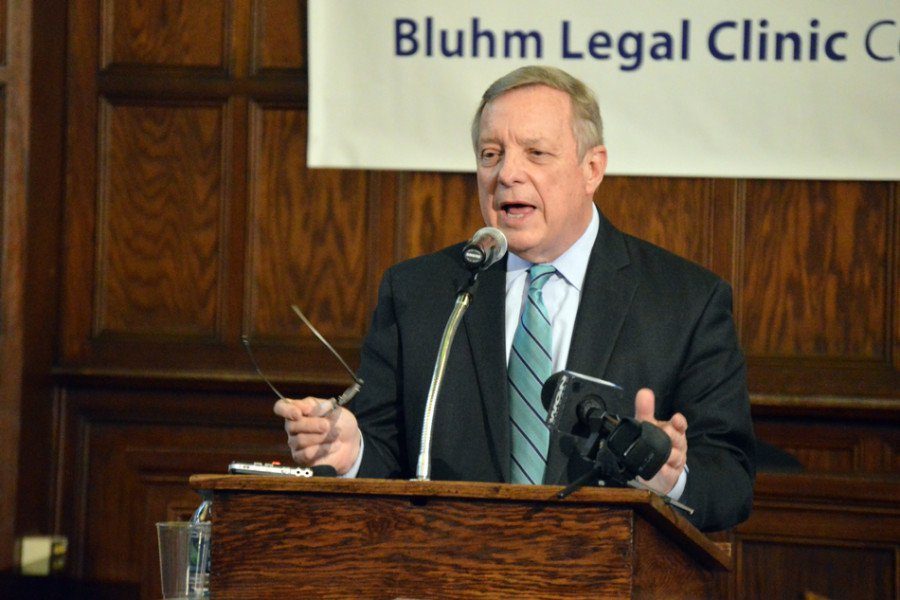U.S. Sen. Dick Durbin urges big pharma action on opioids at law school talk
Daily file photo by Paige Leskin
Sen. Dick Durbin speaks at the Northwestern Pritzker School of Law in 2015. Durbin spoke on Thursday on the opioid epidemic, saying the medical community and pharmaceutical companies have a responsibility to help end the crisis.
October 20, 2016
The opioid crisis is everyone’s problem, U.S. Sen. Dick Durbin (D-Ill.) said on Thursday on Northwestern’s Chicago campus, but big pharma needs to admit their complicity in the epidemic and take steps to combat it.
Durbin spoke at the Northwestern Pritzker School of Law as part of an interdisciplinary approach to the opioid epidemic. Durbin said the increase in prescription painkillers since the 1990s has done irreparable damage on the country.
“The pharmaceuticals are flooding our community with greater and greater quantities of these drugs,” he said. “The result: two million Americans addicted to opioids.”
In the last half of the 20th century, Durbin said, the medical community and pharmaceutical companies decided no pain should go untreated, and if the resources were there to alleviate pain, they should be used.
Durbin said it was a rightful cause, but the idea that the pills used to treat it wouldn’t be addictive — and that patients would only take the prescribed number of pills per day — was mistaken.
The industry has also been responsible for television advertisements that normalized the use of opioids and made people work to convince their doctors to write them a prescription, Durbin said.
Durbin said it was ironic that there have been recent advertisements for drugs that treat the side effects of opioids.
“Now it’s become so common that we have to deal with the side effects of opioids pills, and we do it on television,” he said.
Durbin said that although big pharmaceutical companies deserve their share of the blame, doctors also need to step up to help combat widespread addiction.
“We are appealing to, begging those who are writing prescriptions … to be more mindful of what they are doing,” he said. “We have got to appeal to the medical professionals … they have got to be able to say no.”
Many opioid prescriptions are for those with chronic or acute pain, Durbin said. Patients with that sort of pain are often subjectively diagnosed, as they result from diseases or conditions that are not easily discernible.
The senior Senator said he knows about the struggle of chronic and acute pain through the illness of one of his children. With this in mind, finding a way to effectively limit doctors from writing errant prescriptions might be tough, he said.
“Chronic and acute pain is a reality,” he said. “It is a battle I don’t think we can legislate. It’s so personal, so specific.”
School of Law Prof. Juliet Sorensen, one of the organizers of the symposium, said after Durbin’s speech that the failure to prevent the opioid crisis should be collectively shared among doctors, lawyers and people in other professions.
Hope isn’t enough, Sorensen said, and the professional community needed to respond.
“For us to emerge from the opioid crisis, it is essential to recognize that success will also have a hundred fathers and mothers from the justice system, from medicine, from science from … policy makers and legislators,” she said. “I hope today is not an end into itself.”
An institution like Northwestern was “perfect” to help combat opioid addiction, Sorensen said.
“Getting things done through the legislative process can be long and slow,” she said. “A university has the depth and breadth of expertise here on the faculty and also within the community to create opportunities like this for further strategy and collaboration.”
Sorensen said a way the medical industry could help limit addiction would be to expand insurance coverage for interdisciplinary pain management.
Marcia Hovorka, who said she is a mother of an addict, said the whole symposium was a bit reassuring.
“There are people out there who care,” she said.
Durbin said it was interesting that opioid addiction was just getting widespread attention. A reason for that could be that opioid overdose deaths were spreading from the inner city to the suburbs, he said.
“There is no town too small and no suburb too wealthy to be spared,” he said. “The fact is it’s nationwide. It’s blue state and red states. Everyone is getting hit with this, and it’s sobering.”
Email: [email protected]
Twitter: @noracshelly


